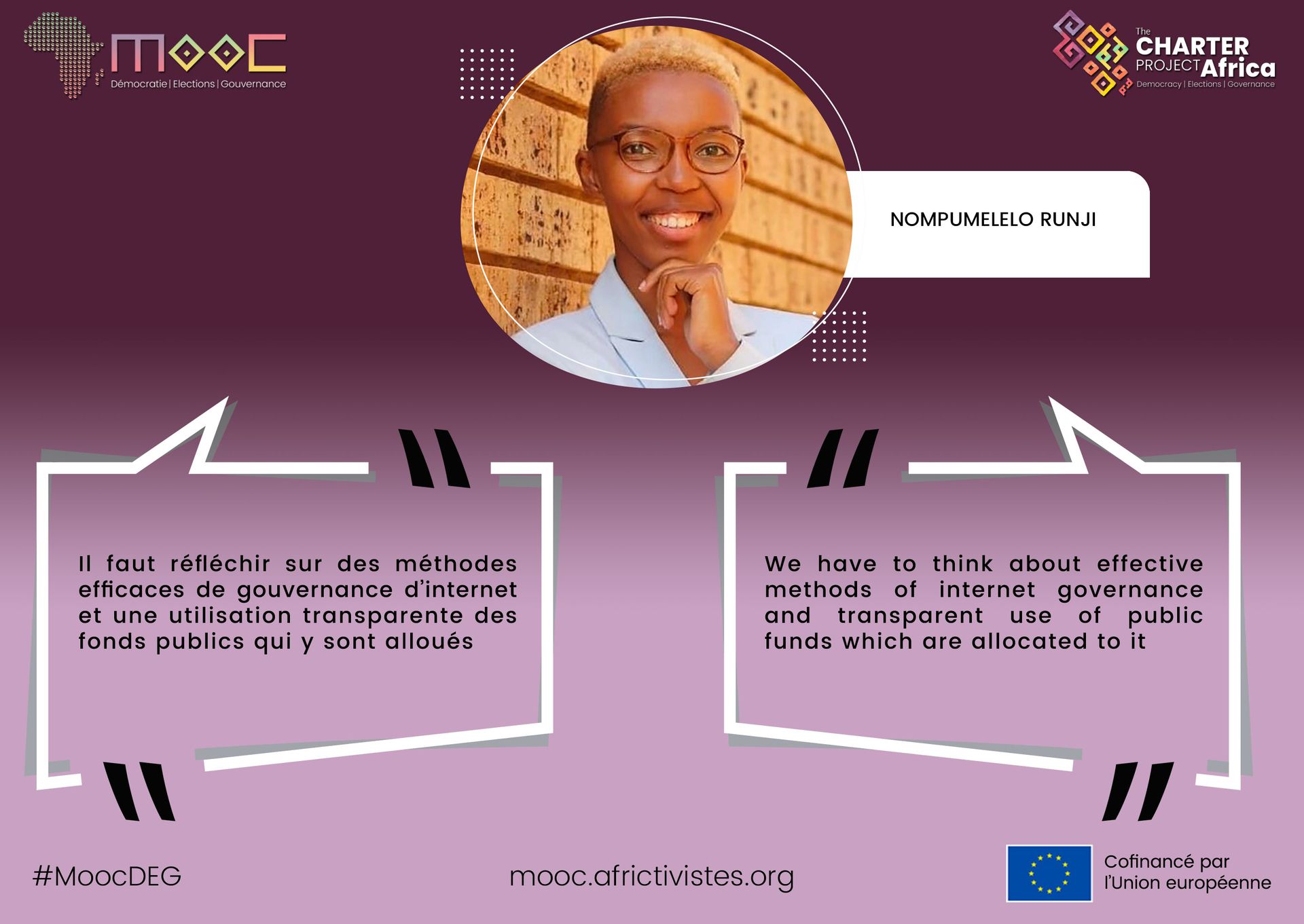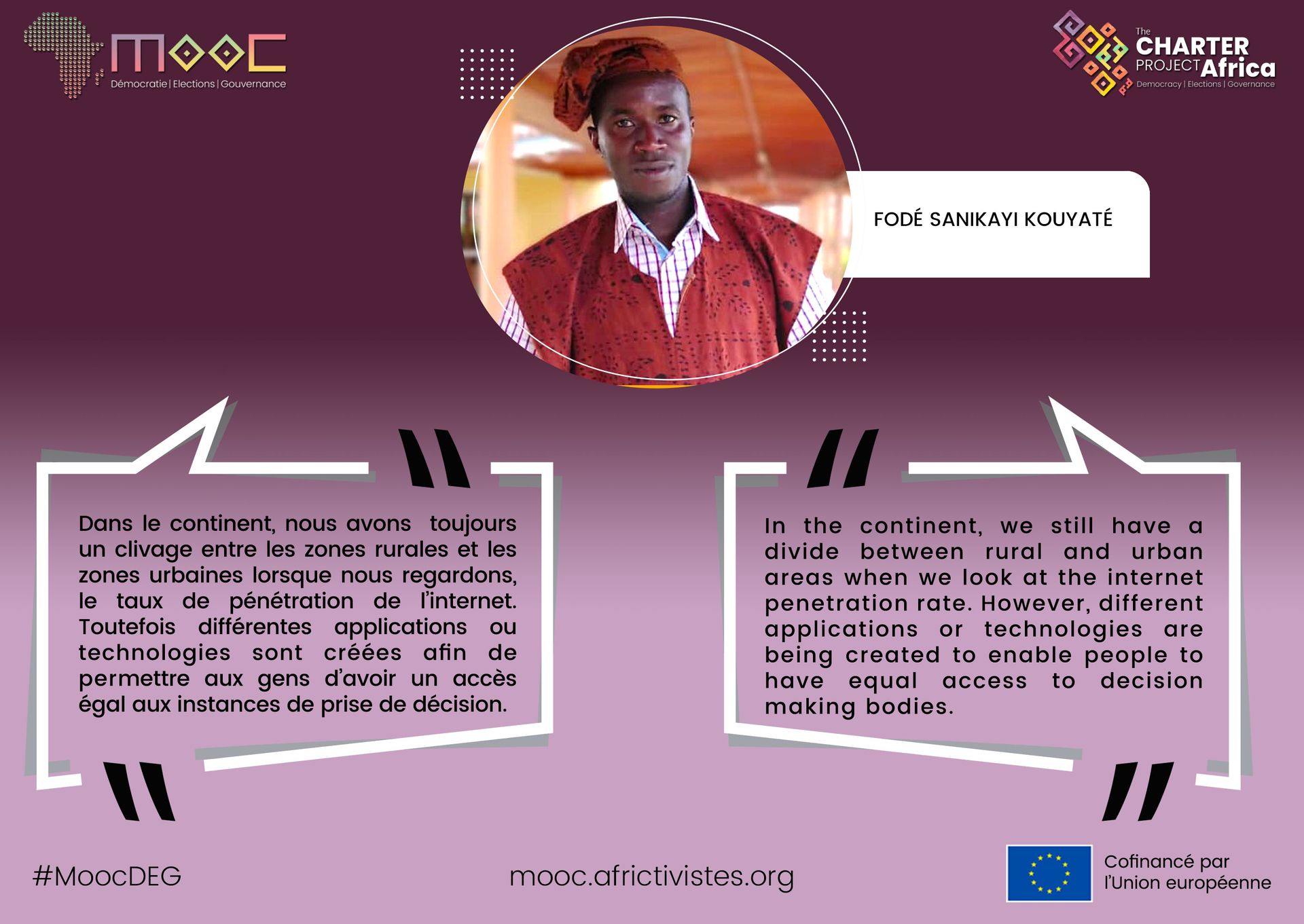AfricTivistes hosted on August 12th 2022 the second webinar of the Friday Series of the Mooc Democracy, Elections and Governance in Africa" themed “Citizen participation and Civic Tech: overview and challenges in Africa". Nompumelelo Runji of Democracy Works Foundation and Fodé Sanikayi Kouyaté, executive member of AfricTivistes and Mayors’ coordinator in AfricTivistes’ digital Open Governance project, Local Open GovLab (LOG), were the speakers of this session moderated by Mr. Maurice Thantan, Project Officer at AfricTivistes.
Kindly find the podcast
A recent concept, civic technology (Civic Tech) encompasses both technologies and approaches that promote and strengthen the role citizens play in public debates and decision-making in the democratic functioning of societies and communities.
In Africa, the rise of Civic Tech has coincided with several key moments: the democratisation of access to the Internet, the development of social networks and the proliferation of training in the digital technology sectors.
Over the past decade, the eruption of technology into the public sphere and more specifically into democratic debate has continued to produce striking results. From the #Sunu2012 online election campaign in Senegal to the #MonElu mobile app in Mali, Civic Tech can vary depending on the context of their development. Dozens of Civic Tech initiatives have emerged in Africa with varying degrees of success.
However, on the African continent, the need for democratisation expressed by young people poses significant challenges. It is therefore legitimate to ask whether Civic Tech can provide clear answers to the various questions. This approach would only make sense if a profound reflection is carried out on the subject.
C’est dans cette optique que s’inscrit ce webinaire dans le cadre du MOOC “Démocratie, Élections et Gouvernance en Afrique”, activité du Charter Project Africa.
Below are the presentations of the different panelists.
Nompumelelo Runji, Democracy Works Foundation

"Those who implement public policy must work to improve access"
"We need to work on bringing citizens closer to the decision-making bodies. There must be mechanisms in the various state institutions that allow for the collection of citizens' opinions. In any case, citizens are always called upon to express their opinions.
“So, for democracy to work, citizens must be involved in decisions taken to improve their living conditions. But also on all the decisions that affect democratic procedures and the choices expressed during an electoral process.
“Today, when we look at the African democratic landscape, we realise that there is a strong commitment from African civil society. People are organising themselves into pressure groups and seeking to bring about certain democratic changes and in other aspects of political, economic and social life.
“And when we talk about Civic Tech, it's about enabling citizens to engage very actively and have a very significant impact in promoting change as a civic actor (...)
“On the continent, we still have a divide between rural and urban areas. When we look at, for example, the penetration rate of ICTs or the way technologies are developed and even just simple phones, different applications or technologies are created to enable people to have equal access to decision-making bodies or even local governments. (...)
“We need to look at how those who are in the most remote areas can access these technologies. Those who implement public policies need to work to improve access.
“I think civic tech could play a role in amplifying citizens' voices via mobile technologies. (...)
“We need to look at how civic tech can be used to ensure internet governance and that public funds are used transparently and not misused. Indeed, when citizens are not satisfied with the performance of some officials, they must have the opportunity to report it via technological mechanisms that allow their leadership to take appropriate actions.”
FODÉ KOUYATÉ, member of the AfricTivistes Core Team

"Few Civic Tech actors have the capacity to make data talk"
"By Civic Tech we mean all the processes, tools and procedures that are put in place to influence decision-making processes, either in terms of proposals or in terms of critical actions, using information and communication technologies. It is also any use of technology to improve political or economic governance in our different countries.
“Today, when we talk about Civic Tech, we refer more to the political aspect than to the economic aspect. This is unfortunate, because we must also focus on the other aspects to improve governance based on technologies.
“I think that there is already a great deal of progress in terms of access to information, which has become essential. Especially since the internet is not limited to the telephone network, i.e. calls and sms. The internet has become central to all access to information. So, we can appreciate the level of access to information through the internet.
“Unfortunately, there is a gap between big and small towns in terms of access to information. Not to mention the issue of the quality of the information that is available in most of our countries and the type of content used.
“This is where the issue of data comes in. Do we have enough data today that can really convey the real information that citizens are looking for? Do these channels allow us to circulate everything among ourselves? Is it made available? We should ask all these questions while recognising that there has been progress in terms of access to information on a certain scale.
“It is true that there has been a clear improvement in the circulation of information in terms of quality and the data needed on a given subject matter. However, one wonders whether all this data is put into usable formats. We can also ask ourselves whether the people who handle this data have the necessary qualifications.
“Today, only a few stakeholders in civic tech, working on governance issues or are interested in data, have the capacity to make this data talk. So the question of capacity building is central. And not just on the policy side."
About thirty participants attended the webinar, which was very interactive and which shows that the issue of civic tech is of interest to many young Africans and civil society actors.
Mr. Tidiani TOGOLA, Executive Director of the Tuwindi Foundation, was supposed to be a speaker but unfortunately could not join the webinar to share his experience.
See you soon on a new webinar on another topic within the framework of the MOOC Democracy, Elections and Governance in Africa.
By Seydina Bilal DIALLO and Abdou Aziz CISSE (translated by Aisha Dabo)